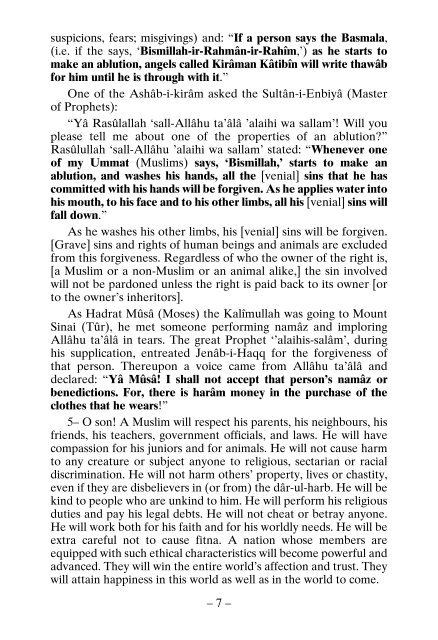O Son !
THE BOOK ‘O SON’ Al-hamdu lillâhi Rabbil ’âlamîn. Wa-s-salâtu wa-s-salâmu ’alâ Rasûlinâ Muhammadin wa Âlihi wa Sahbihi ajma’în. 1– O son! Collecting from books written by the scholars of the Hanafî Madhhab three hundred and sixty hadîth-i-sherîfs and forty-four khabars and also the seven essentials and the five rukns and the seven wâjibs and the fourteen sunnats and the twenty-five mustahabs and the fourteen mufsids of namâz, I have explained them for you. Adapt your acts and deeds to these teachings so that you attain fayz and nejât (salvation)! 2– Also for your information, I have collected a thousand and ninety âdâb (adabs) for you and for other young Muslims like you. If you adapt your actions and acts of worship to these teachings, they will be sufficient for you. If you laze, disobey Allâhu ta’âlâ and cease from these practices and manners, you will be afflicted with slavery and disgrace in the world and subjected to torment in the world to come. If you live up to them and advise your Muslim brothers to do the same, it will be useful for you. They will say blessings over you. And Haqq ta’âlâ will accept their invocations. For, a slave will be pardoned on account of another slave’s invocations for them.
THE BOOK ‘O SON’
Al-hamdu lillâhi Rabbil ’âlamîn. Wa-s-salâtu wa-s-salâmu ’alâ
Rasûlinâ Muhammadin wa Âlihi wa Sahbihi ajma’în.
1– O son! Collecting from books written by the scholars of the
Hanafî Madhhab three hundred and sixty hadîth-i-sherîfs and
forty-four khabars and also the seven essentials and the five rukns
and the seven wâjibs and the fourteen sunnats and the twenty-five
mustahabs and the fourteen mufsids of namâz, I have explained
them for you. Adapt your acts and deeds to these teachings so that
you attain fayz and nejât (salvation)!
2– Also for your information, I have collected a thousand and
ninety âdâb (adabs) for you and for other young Muslims like you.
If you adapt your actions and acts of worship to these teachings,
they will be sufficient for you. If you laze, disobey Allâhu ta’âlâ
and cease from these practices and manners, you will be afflicted
with slavery and disgrace in the world and subjected to torment in
the world to come.
If you live up to them and advise your Muslim brothers to do
the same, it will be useful for you. They will say blessings over you.
And Haqq ta’âlâ will accept their invocations. For, a slave will be
pardoned on account of another slave’s invocations for them.
You also want an ePaper? Increase the reach of your titles
YUMPU automatically turns print PDFs into web optimized ePapers that Google loves.
suspicions, fears; misgivings) and: “If a person says the Basmala,<br />
(i.e. if the says, ‘Bismillah-ir-Rahmân-ir-Rahîm,’) as he starts to<br />
make an ablution, angels called Kirâman Kâtibîn will write thawâb<br />
for him until he is through with it.”<br />
One of the Ashâb-i-kirâm asked the Sultân-i-Enbiyâ (Master<br />
of Prophets):<br />
“Yâ Rasûlallah ‘sall-Allâhu ta’âlâ ’alaihi wa sallam’! Will you<br />
please tell me about one of the properties of an ablution?”<br />
Rasûlullah ‘sall-Allâhu ’alaihi wa sallam’ stated: “Whenever one<br />
of my Ummat (Muslims) says, ‘Bismillah,’ starts to make an<br />
ablution, and washes his hands, all the [venial] sins that he has<br />
committed with his hands will be forgiven. As he applies water into<br />
his mouth, to his face and to his other limbs, all his [venial] sins will<br />
fall down.”<br />
As he washes his other limbs, his [venial] sins will be forgiven.<br />
[Grave] sins and rights of human beings and animals are excluded<br />
from this forgiveness. Regardless of who the owner of the right is,<br />
[a Muslim or a non-Muslim or an animal alike,] the sin involved<br />
will not be pardoned unless the right is paid back to its owner [or<br />
to the owner’s inheritors].<br />
As Hadrat Mûsâ (Moses) the Kalîmullah was going to Mount<br />
Sinai (Tûr), he met someone performing namâz and imploring<br />
Allâhu ta’âlâ in tears. The great Prophet ‘’alaihis-salâm’, during<br />
his supplication, entreated Jenâb-i-Haqq for the forgiveness of<br />
that person. Thereupon a voice came from Allâhu ta’âlâ and<br />
declared: “Yâ Mûsâ! I shall not accept that person’s namâz or<br />
benedictions. For, there is harâm money in the purchase of the<br />
clothes that he wears!”<br />
5– O son! A Muslim will respect his parents, his neighbours, his<br />
friends, his teachers, government officials, and laws. He will have<br />
compassion for his juniors and for animals. He will not cause harm<br />
to any creature or subject anyone to religious, sectarian or racial<br />
discrimination. He will not harm others’ property, lives or chastity,<br />
even if they are disbelievers in (or from) the dâr-ul-harb. He will be<br />
kind to people who are unkind to him. He will perform his religious<br />
duties and pay his legal debts. He will not cheat or betray anyone.<br />
He will work both for his faith and for his worldly needs. He will be<br />
extra careful not to cause fitna. A nation whose members are<br />
equipped with such ethical characteristics will become powerful and<br />
advanced. They will win the entire world’s affection and trust. They<br />
will attain happiness in this world as well as in the world to come.<br />
– 7 –

















